|
Maison Dieu
Dover
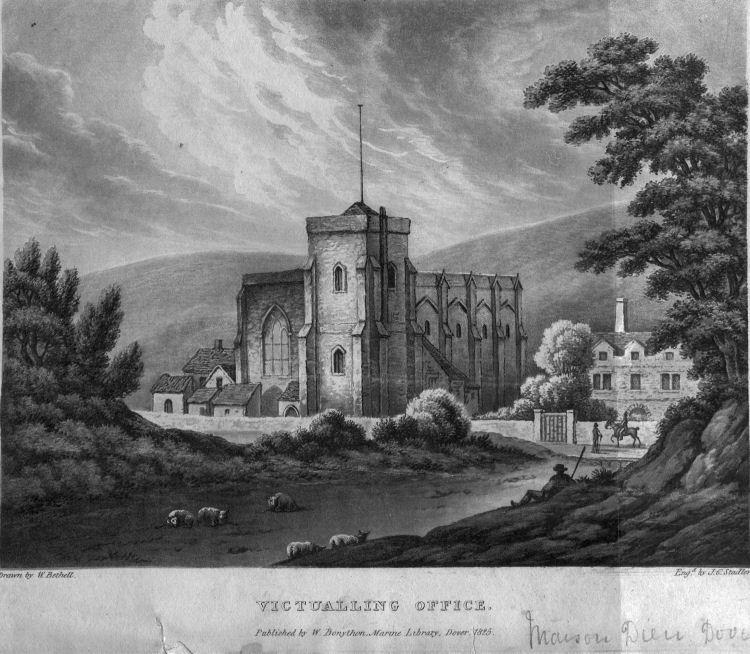 Drawn by W Bethell. Engraved by J C Stadler.
Published
by W Bonython, Marine Library, Dover, 1825.
|
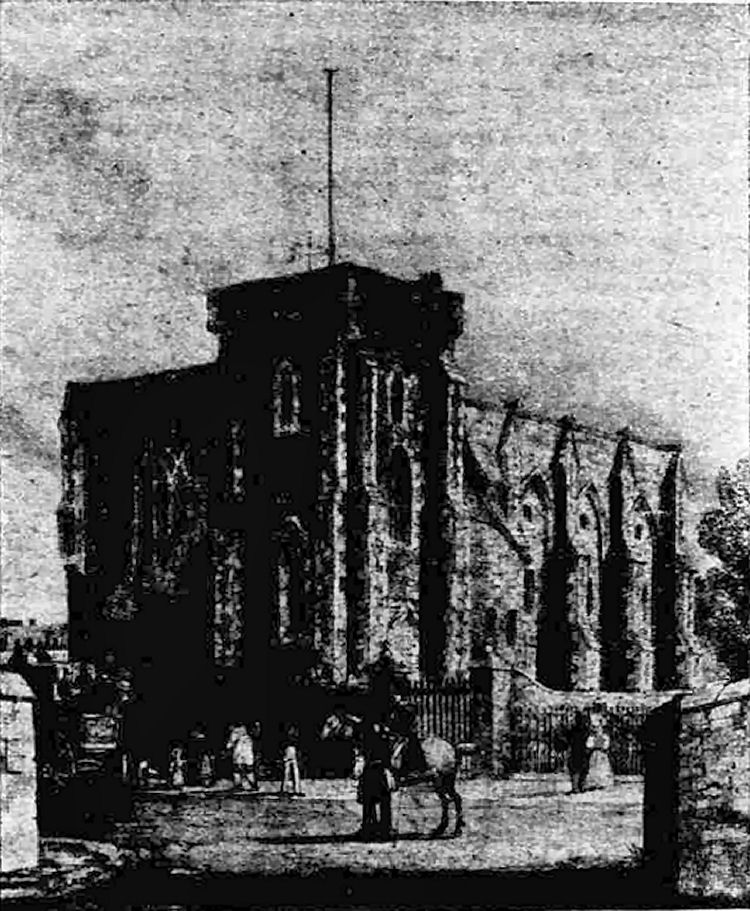
Above engraving 1833. |
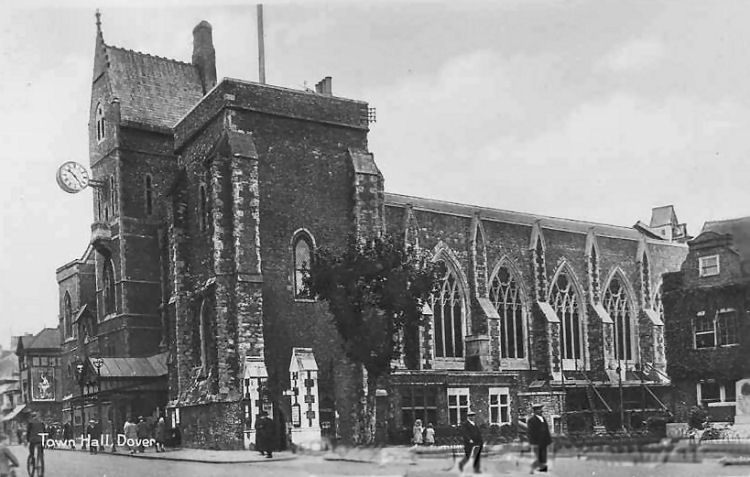
Above photo, date unknown. |
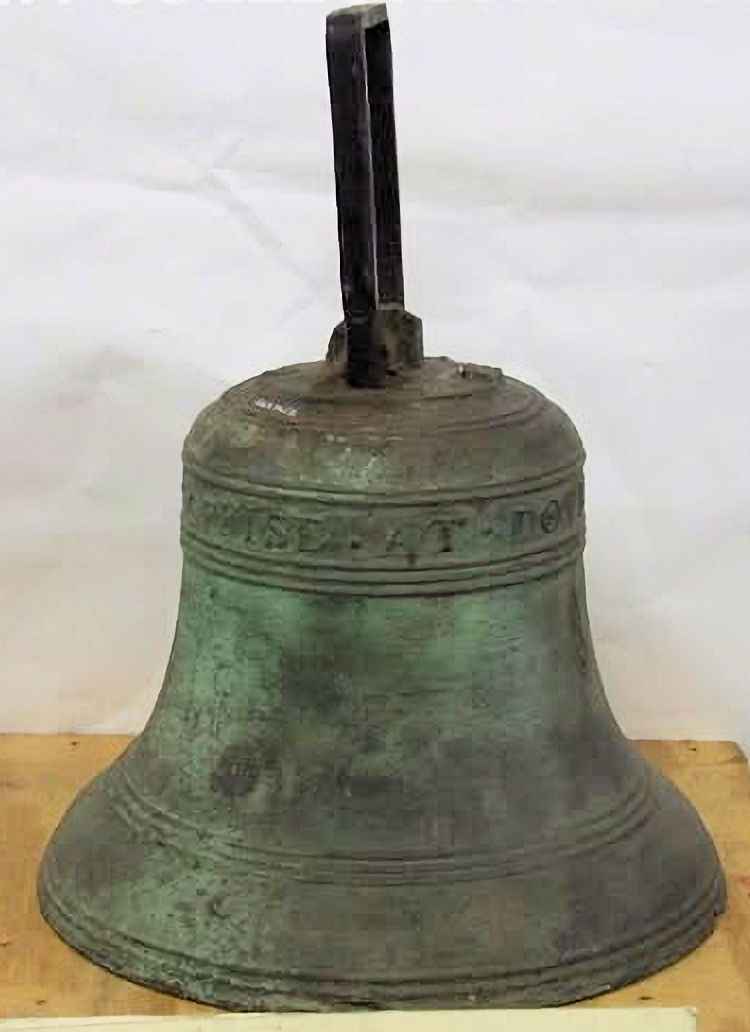
Above photo, showing the bell used at the Victualling Yard. Currently
held at the Greenwich Maritime Museum. |
In the High Street is the noble hall and truncated fabric of the Maison
Dieu founded by Hubert de Burgh in the 13th century for the reception of
pilgrims of all nations. From the time of Henry VIII. (1500's) to 1830 it was used as
a crown victualling office, but was subsequently purchased by the
corporation and adapted as a town hall.
A bit of borrowed content about the Victualling Office:
Michael Russell, Agent Victualler of Dover. Born in 1711, you are a linen
draper made good, who rose to become Mayor of Dover in 1755. With the
support of your influential friends the Earl of Hardwicke and Lord Anson you
were appointed Agent Victualler in Dover in about 1770. This was a
prestigious position with a good income and a fine house. This was much to
the dismay of many other local men who sought the position!
You are in charge of the Dover Victualling Office, the smallest of 5 such
victualling yards in England, but still a large site, employing hundreds of
local people, whose role was to provision ships of the Royal Navy,
particularly for long voyages at sea.
The other victualling offices are in London (near the Tower of London and at
Deptford) and at Portsmouth and Plymouth.
The victualling yard employs men as bakers, brewers, butchers, coopers,
carters, and a good few women too, including as cooks and washerwomen.
It produces large quantities of ship’s biscuit from its Bake House and Store
House in the Maison Dieu Stone Hall. It has 3 large ovens on the ground
floor, and storerooms on two floors above for sacks of flour and biscuit and
barrels of beer, which is also brewed on site.
The biscuit (made from salt and water dough) is rock hard and salty, but
lasts indefinitely at sea, and was a staple provision for sailors (and
soldiers for hundreds of years. It sometimes became infested with weevils,
that were either removed by tapping them out or eaten as extra protein!
The Dover yard also took in live cattle and hogges (pigs), which were
slaughtered, then cut into small joints of meat, salted and packed in
barrels. Barrels were made on site too in a cooperage, and there was also a
pea-drying house.
Maison Dieu House, your fine brick-built house was built in 1665, the same
year as the Great Plague, as the home and office of the Agent Victualler. It
has lovely gardens and an orchard.
You live here with your wife Hannah and your 3 boys. Henry, your youngest
son, born in 1751 rose to become a judge in India.
Your job is to buy in grain, livestock and other provisions at competitive
prices, and turn them into food and drink for the navy - food and drink that
will last for months or years at sea, and that means its ships can travel
the world – fed by the Victualling Office in Dover!
You’ve even supplied provisions for Captain Cook on his famous voyages to
the far ends of the earth, including the exploration of a new Continent
called Australia.
You sometimes entertain important visitors. In June 1772 for example the
Earl of Sandwich visited from his yacht which was anchored offshore.
Above written by Paul Wells.
|
Kentish Gazette 22 February 1769.
Dover, Victualling-office, Feb. 23. 1769.
This is to Give Notice, that on Wednesday the First of March next, at
Ten o'Clock in the Forenoon, Mr. Michael Russell, Agent for the
Victualling at this Port, will be ready at his Office, at the Maison
Dieu, to receive Tenders and Samples for furnishing Six Bags of Hops,
for the Victualling Service at the said Port. |
|
From the Dover Telegraph and Cinque Ports General
Advertiser, Saturday 25 January, 1834. Price 7d.
MAISON DIEU
The order recently received by the Royal Engineer department, to
give up this venerable edifice, preparatory to its sale and demolition,
has excited the utmost surprise and regret. These extensive premises
were for many years occupied by the Victualling Office, and some time
after breaking up of that establishment here, the buildings were marked
out of lots for public sale. A representation being made to the Duke of
Wellington, then at the head of His Majesty's government, His grace at
once saw the importance of the station as a depot for the engineer and
ordnance stores. A military commission having made a favourable report
thereon, a considerable sum was given by the Board of Ordnance to the
Victualling department, for the transfer of the property, and the
stores, having been removed there from North's Battery, the present
establishment, including the commandant's residence, together with his
offices, &c. have recently been finished at a great expense, the
establishment being now the most complete of its kind in the kingdom;
and, from its central position between the castle and heights, the
advantage in the conveyance of stores might, hereafter, prove of the
greatest importance. The tower of the Maison Dieu has been pronounced,
by one of the first military engineers, to be the finest position for
defence against inland attack, that Dover affords; commanding, as it
certainly does, every road to the town.
This venerable relic of antiquity was erected by Hubert de Burgh, the
famous defender of Dover Castle, during two successive sieges by the
French, who were commanded by their Dauphin in person. The hospital,
which has long since been destroyed by ravages of time, was intended to
afford temporary relief to pilgrims on their passage to, or from the
continent. It was erected in the reign of King John; but the church, of
which the present edifice formed a part, was not completed till the
following reign of Henry the Third, who was present at the dedication
of it in 1227, when the noble Hubert resigned the patronage of it to his
sovereign. The body or nave was 142 feet long and 89 broad, and was
divided into two sections by seven beautiful arches, resting on lofty
pillars. It is much to be regretted that the larger section, which
contained the grand entrance, was taken down in 1831. The remaining
section and the tower are in such a state of preservation as would defy
the lapse of centuries; and at a small expense be again used as a place
of public worship, which will soon become necessary from the continued
increase of population in its vicinity. That such a complete specimen of
ancient architecture should fall a prey to the pick-axe would disgrace
any age, and particularly the enlightened taste of the present. The Duke
of Wellington is understood to have given a promise, that the buildings
should not be pulled down, and as it is presumed, that the engagements
of a premier are respected by a successor, we dare to hope the ancient
edifice will be spared; and trust the same partied who interest
themselves so effectively on the former occasion, will not hesitate to
renew their representation to His Majesty's present minister, who, if
only on a principle of prospective economy, should pause before they
destroy a range of useful offices, which, in the event of future wars,
could not be replaced for ten times the amount they would fetch, if
sold, "in these piping times of peace."
|
|
From the Dover Express and East Kent Intelligencer, 9 July, 1880. Price 1d.
THE ACCIDENT AT THE MEMORIAL HALL
An inquest was held on Friday afternoon, at the Maison Dieu hall, before
the Borough Coroner (W. H. Payne, Esq.), on the body of Alfred Bayley
Coleman, lying at the Hospital, who was killed by falling from
scaffolding, which gave way at the Memorial Hall, the previous evening.
The Rev. J. F. Frewin was present, and Mr. Worsfold Mowll appeared for
the contractor, Mr. Bromley.
Mr. browning was chosen foreman of the Jury, who having viewed the body,
the evidence as follows was taken.
Charles Coleman, joiner, carrying on business at Sandwich, said: The
deceased is my youngest son, aged 27. He was married, and had two
children. The deceased was working as carpenter at the Memorial Hall, in
the employ of Mr. Bromley, contractor, and he was a very steady man.
Harry Richardson, foreman, working at the hall and who was standing on a
ladder just inside the building, and could see the deceased through a
window on the scaffolding said: Yesterday the deceased was engaged in
fixing the facia board at the chapel. He was on the point of finishing,
and was on the north-west side about 6.40 in the evening when I saw the
staging he was on fly up, and the deceased held up his hands, and then
fell into the yard of the next house, belonging to Mr. Cook. In falling
he must have fallen onto a lean-to roof, and then bounded into the yard,
which was paved with stones. There was another man on the staging, who
also fell. I immediately ran through into the next yard, and saw the
deceased lying flat on the ground. He seemed very much hurt, and his arm
was broken. I lifted him up, and called for assistance. I sent for Dr.
Long, who came and examined the deceased. He was then taken to the
Hospital, and also the other man, neither of whom were sensible.
By Mr. Mowll: I had tried the staging myself before the men went to work
on it. It was about three o'clock yesterday when it was examined, and I
found it was quite safe. There were two men on the staging, and it was
made to hold them. They had been on it about a quarter of an hour before
the accident. We had to work by stages, as we were not allowed to build
a scaffold in Mr. Cook's yard, because he would not allow it. Certainly
a scaffold would have been built had I had permission, but this was a
kind of fixture of ropes, with a board to the inside of the roof. The
scaffolding would have been much safer. Mr. Cook has not refused me
personally, but I believe he has refused.
George Petrie, a labourer in the employ of Mr. Bromley, and working at
the hall, said: Wednesday evening last I erected the staging on the
north-west and other sides. I tried all of them. I nailed two pieces of
wood to each end of the plank, they were on so that the rope by which it
was fastened would not slip. I certainly cannot account for the boarding
given away. I was not there at the time of the accident. The other stagings round the hall are fixed just the same.
By the Foreman: The rope from the plank went up to a piece of wood fixed
on the roof, which was both nailed with two nails and lashed with a
piece of rope which is now missing.
Mr. Mowll said enquiries had been made by the contractor and foreman as
to the rope, but it could not be found.
Charles Wood, House Surgeon at the Dover Hospital, said the deceased was
brought in yesterday evening a little before seven o'clock. I examined
him and found he was already dead, his neck being dislocated, his head
fractured, he had received several injuries and his arm broken. Death
was caused by the injuries received.
Mr. Mowll said a witness could be called who saw Petrie try the staging,
but he did not think it necessary.
Several of the Jury complained of the missing rope.
The Foreman arose and said he thought the best plan would be to adjourn
their decision until they heard the man who was lying ill at the
Hospital give evidence. He would like it adjourned, and asked how long
the doctor thought the man would be before he was well. Mr. Wood said
about three weeks.
The Jury agreed to adjourn their verdict for three weeks from that day,
to be holden at the Town hall at six, o'clock in the evening, to hear
the evidence of Thomas Falconer now lying ill at the Dover Hospital.
It was reported a subscription is being got up for the widow.
|
|
From the Dover Express and East Kent News, Friday, 7 October, 1887. Price 1d.
LICENSES FOR THEATRICAL PERFORMANCES
TOWN HALL
Mr. Knocker applied for the renewal of the license for theatrical
performances at the Town Hall. He stated that every precaution was
taken, there being three main exits from the hall into the street. Water
was also laid on, and a policeman was stationed there at every
performance to turn the water on in case of fire. There were attendants
at each door to keep the exits clear and assist the public in leaving.
With reference to the Town Hall they thought that the two licenses
should run concurrently, and terminate at the same time, and they would
adjourn the application until Friday, 14th instant.
|
|
From the Dover Express and East Kent News, Friday 16 March, 1888.
FATAL TOBOGGANING ACCIDENT
An inquest was held at the Town Hall, Dover, on Friday afternoon, by the
Borough Coroner (Sydenham Payn, Esq.), on the body of Henry Beaumont,
who died from injuries he received, whilst tobogganing on Godwyn Road.
The following gentlemen composed the jury:- Messrs J. Hogben, W.
Jackson, W. H. Fox, Mr. Harley, T. Wright, W. Masters, W. Gilman, W.
Platt, E. Russell, C. L. Adams, W. Hard, G. Spain, W. Burt, J. Parton,
and J. W. Burden. Mr. W. Burt was chosen foreman of the Jury. After
viewing the body, which was lying at the residence of the parents' of
the deceased, Endymion House, Salisbury Road, the following evidence was
taken:-
Samuel Beaumont said: I reside at Endymion House, Salisbury Road, Dover
and I am a manufacturer in France. The body the Jury have viewed is that
of my son, Henry Beaumont, and his age was 9½ years. When I came home on
Saturday 3rd. inst. The deceased was in bed, and seriously injured, but
was conscious. He made no statement with reference to the accident but
only said he would never go tobogganing again. The deceased gradually
got worse and died, yesterday (Thursday) afternoon, at 2 p.m. The
deceased made no complaint against any person.
Percy Allen Gardner, said: I am a pupil at Mr. Wise's school
Godwenehurst, Dover. I knew the deceased, Henry Beaumont. On Thursday
morning March 1st. about 9 a.m. the deceased brother and myself, went up
the hill, on Godwyne Road with a sleigh, belonging to the deceased.
After that sleigh had been down the hill once, the deceased, his brother
and myself got on, the deceased being in front. We came down the hill,
and tried to get through two posts, but ran into one of the posts. The
deceased's brother, Ernest Beaumont, was steering. When the sleigh
struck the post, the deceased was knocked off and struck the post. I was
also knocked off and lay in the middle of the road. Whilst lying on the
ground, I saw Ernest put the deceased on his sleigh, and afterwards took
him home. The deceased did not speak, but muttered, and I did not think
he was seriously hurt. We did not strike against any other sleigh, when
coming down the hill.
Ernest Beaumont said:- On Thursday morning the deceased, my brother, the
last witness and myself, went tobogganing on Godwyne Road. I went down
the hill on the sleigh the first time and the deceased, the last witness
and myself started the second time. The deceased was in the front, and I
was behind, steering, Percy Garnder being in the middle. We went down
the hill about 3 yards from the gutter and when we got about 2 yards
from the posts we ran against a piece of wood, which got into the
runners of our sleigh and turned it off, and ran into one of the posts.
Percy Gardner was thrown off and also the deceased who struck the post
and fell on his side. We were going at a great speed when we struck the
post. I was thrown off, and when I got up I picked my brother up and put
him on my sleigh, and took him home. The deceased did not speak but
groaned.
Dr. Ormsby who was called to see the deceased gave evidence, and stated
that after putting the deceased under chloroform as he was in great
pain, he examined him, and found his left leg was broken and an
extensive contusion over the right loin. The deceased gradually grew
worse, and died on Thursday morning from the injuries he had received.
The Coroner in summing up, said it was a very sad affair for a young lad
to be taken away in the midst of pleasure. He had no doubt the
tobogganing was a good amusement if carried out in proper places; but he
was surprised to see so many persons indulging in this amusement in
public places, where they might easily come in contact with the iron
gutters and railings. He hoped that the present case would be a warning
to those persons not to carry it on in the streets and roads. He thought
it was a mistaken kindness to allow it to be carried on. He hoped those
persons would find a safer place in future for their amusement.
The Jury returned a verdict of “Accidental Death.”
|
|
From the Dover Express and East Kent News, Friday, 26 October, 1888. Price 1d.
THEATRICAL LICENSES
Mr. E. W. Knocker applied for the renewal of the theatrical license for
public performances and stage plays at the Town Hall.
The Surveyor, in his report upon the building, stated that the condition
of the premises to which the license was granted last year remained the
same.
The application was granted, the sureties being Mr. E. W. Fry and Mr.
Edward Lukey.
Mr. Knocker said it would be the last occasion on which the bench would
grant the licenses. He would have to go to the County Council in the
future.
|
|
From the Dover Express and East Kent News, Friday 21 February, 1890.
DEATH OF OPIUM EATER IN DOVER
On Wednesday evening Mr. T. Lewis, held an inquiry at the Town Hall, on
the body of an aged woman named Harriet Stickles. She had for years been
in the habit of taking opium, but for the last six months, had given it
up. On Sunday night, she, not feeling very well, took a small piece of
opium. About three o'clock she fell into a deep sleep from which she
never woke. It is supposed, that not having taken any for so long a
time, the opium had more effect than she had imagined.
Mr. Ruglys was chosen foreman of the Jury, and after the body had been
viewed, the following evidence was taken.
James Stickles, the husband of the deceased said: I live at 17, Bridge
Street. My wife was 71, years of age, and she died on Monday evening a
little after seven. She has been out of health for years, and was not
very well last week being in bed three of four days, but was up on
Sunday. She suffered from asthma, but has not been under medical advice,
as she said nothing would do her any good. On Sunday she went to bed
about ten, and about three she went to sleep, never to wake again. She
had taken some opium, which she had been in the habit of taking for
years, but had left off for the last six months. On Sunday morning I
obtained two-pennyworth of opium for her, from Mr. Ralph the chemist.
The box produced is what it was in, and the opium which is in it, is
part of what I bought. She took a small pill of opium between nine and
ten on Sunday night, and about twelve o'clock she got out of bed to take
another piece as she felt restless, but she could not get round the bed.
I declined to fetch it for her as I did not think it did her any good.
About three in the morning she went to sleep but I have never known her
to go to sleep from the effects of opium before. When I got up in the
morning I tried to wake her but could not, the landlady then came up and
washed her face, but that did not rouse her. At mid-day she was still
asleep. My daughter went about that time for a doctor, but he was not at
home, she then went to two or three others, but they were all out. My
wife continued sleep all afternoon, breathing gently, but about seven
she ceased to breathe. Mr. Long came about half-past six, but he said
she was too far gone. She has not eaten anything for the last fortnight
having no appetite. I tried her with all the things I could afford to
buy.
Alice Terry, wife of John Terry, a mariner living at the Pier, and
daughter of the last witness, said she went to see her mother on Monday
morning, and finding her in a deep sleep, from which she could not be
aroused, she went to Mr. Long, who was out, so she went to Mr. Woods,
who was also out. Mr. Osborne was engaged, Mr. Waters was out, and Mr.
Best was also from home. She went to Mr. Patmore and got a medical
relief order fro Mr. Long. He was still out when she went to his house,
but he came up as soon as he got home.
Mr. T. M. Ralph, junior, said that Mr. Stickles came in on Sunday
morning for two-pennyworth of opium at their shop, and he served him
with 28 grains. He used to purchase about six-pennyworth a week. The
opium remaining in the box, had been weighed at the shop that morning
and was 28 grains.
Mr. Long said: I went to 17, Bridge Street, on Monday evening about
twenty to seven, and there saw Mrs. Stickles in bed, breathing very
gently, but unconscious. I had been told that she had taken opium, and
from the appearance of her skin and breath, I am of opinion that a dose
of opium was the cause of her death. Her husband told me that she had
taken two pills, but he said that he disapproved of her taking the
second dose. He was very positive about this. I had been told that she
had been asleep from three o'clock that morning. So long a time had
elapsed since it was taken that it would be impossible to take any means
to get it out of the stomach, as it would be in the system. She was too
far gone to answer to any restoratives, or any stimulants. I tried her
with strong ammonia, but she did not even notice it. I have heard the
evidence that 28 grains were sold, and I have weighed it on my scales,
and found 28 grains. I was not present when Mr. Ralph weighed it. In her
state, a small dose would have a greater effect than usual. I am of firm
opinion that opium hastened her death, if it did not cause it. By the
time opium on an empty stomach had produced deep sleep, it would be
diffused throughout the system.
By the Jury: I could not say what dose would be fatal to an adult person
in sound health, but in her state, on an empty stomach, three grains
would most likely be fatal. From what I have heard, she has been
suffering from the prevailing epidemic, and was left in an extremely
weak state.
The Coroner in summing up, said that she had probably mistaken the dose
she meant to take, and in her weak state it proved fatal.
The Jury brought in the following verdict:- “That deceased met her death
through misadventure, from the effect of a dose of opium, which in her
weak state had a greater effect than she anticipated.”
|
|
From the Dover Express and East Kent News, Friday 20 March, 1925. Price 1½d.
A DELIBERATE CASE OF SUICIDE
DOVER MAN'S CAREFUL PREPARATIONS
The Borough Coroner (Mr. E. T. Lambert) held an inquest at the Town Hall
of Friday on Thomas Duncan Riddiford, of 18, Union Row, who was found
dead in bed on Thursday at one o'clock with a gas tube by his side, the
tube leading up through a hole in the floor from the gas jet in the room
below.
Mrs. Daisy Grace Riddiford, widow of the deceased, living at 46, Thanet
Gardens, Folkestone, said that her husband was 35 years of age. He had
recently been a miner, and was an R.I.C. (Royal Irish Constable)
pensioner. He lived at 18, Union Row. It was two years last September
since she last lived with him. On the previous Friday he came over to
see her and asked her to take a temporary charge of their children, who
were in his custody, while his housekeeper was away. She did so, and she
had them now. The next she heard of him was when she received the
following letter from him on Thursday:- “Dear Daisy, - By the time you
receive this I shall be in another world. I see no prospect of carrying
on by myself. I am very sorry things have turned out so rough for you,
and although I am leaving a great burden on your hands I am afraid I
have gone too far to help myself. Please say nothing to the children,
and kiss them for me. Of course, everything in the house is yours
legally, so when you receive this the best thing you can do is to go to
the Police and tell them.” There was no signature to the letter. On
receipt of that letter she came to the Dover Police, and went to the
house with the Police. She had identified the body. The deceased was a
bad tempered man, but had never threatened to her to do anything of this
sort before.
Mrs. Marion Kate Spicer said she lived at Flat 11, 217, Blackstock Road,
Highbury. She knew the deceased well and acted as his housekeeper until
the previous Friday. She went there in November, 1922. On the previous
Friday she left him because she was afraid. He was of a violent temper,
and used to go mad sometimes. “He has nearly killed me twice,” continued
witness. He had always threatened he would kill her and then take his
own life. He said this every time they had a few words. She had
complained to the Police, and was advised to leave him. After she left
him on the previous Friday she did not hear any more of or from him
until the Police informed her that he was dead. She did not believe he
would carry out these threats, although he once got the oven ready. She
thought it was simply to frighten her. He had warned her that if she
left him he would do this thing.
The Coroner: Is this letter “My dearest Tom” signed “Kit,” from you to
him?
Witness: Yes, sir. I left that for him on the previous Friday morning.
Inspector Baker said at 12.45 p.m. on Thursday the first witness,
accompanied by Inspector Preston, of the N.S.P.C.C., came to the Police
Station and produced the letter which had been read, and stated that
they had been to No. 18, Union Row and had obtained no reply from
repeated knocking. He accompanied them to that address and knocked at
the door, without result. He passed through a neighbour's house to the
back, where he climbed the wall and entered the premises through the
back door, which was unfastened. There was a smell of coal gas, and on
going to the front bedroom, the door of which was closed, and a blanket
placed in the crevices and under the bottom, he saw the deceased lying
dead in bed. Another blanket was hung loosely over the curtains, but the
window was four or five inches open. Witness then went downstairs, and
found the gas fittings had been removed from the gas-jet in the front
room and about 10ft. of metallic flexible gas tubing (new) had been
attached to the jet, which was turned on. A hole had been knocked in the
ceiling downstairs and a hole made in the floor of the bedroom above,
and the tubing passed through the hole, the end of the tubing being ten
or twelve inches from the face of the deceased, resting on the dressing
table. Dr. Richardson, the Police Surgeon, was informed, and came and
examined the body. On the floor of the bedroom witness found, loose, 9s.
4d., on the table in the kitchen a wallet with £8 10s. in Treasury
notes, and a Post Office Savings Bank book showing a credit of £83 10s.,
and a letter which was practically illegible.
Dr. Richardson, the Police Surgeon, said that shortly after 1 o'clock on
Thursday he went to 18, Union Row. He found the deceased in bed. He had
been dead some hours. There was a strong smell of gas. He noticed a tube
reaching from the dressing table alongside the bed, close to the
deceased, as described by the Inspector. Deceased was undressed with the
exception of a shirt, and he was lying on his back. His death was due to
coal gas poisoning, self administered, he should think.
The Coroner said he had no option but to return a verdict in accordance
with the medical evidence. It was a most deliberate case; in fact, one
of the most determined he (the Coroner) had ever come across. It was
most deliberate in every way, and there was no doubt what the man did.
But, considering what the witness, Mrs. Spicer, had said, he thought
that there was no doubt the state of the deceased's mind was not as it
should have been, and he, therefore, found a verdict that death was due
to coal gas poisoning, and that at the time the deceased was not of
sound mind.
In reply to the Coroner, Dr. Richardson said he thought he man put the
tube into his mouth.
The funeral took place on Monday at St. Mary's cemetery, the rev. O. F.
R. Strickland officiating. The mourners present were Mrs. Riddiford
(widow), Mrs. Currell and Mrs. Cobb (sisters-in-law), and Mrs. Smith.
There were no floral tributes. Mr. B. J. Andrews, of 22, New Street, and
34, Longfield Road, carried out the funeral arrangements.
|
|
From the Dover Mercury, Thursday, 9 December, 2010.
PRISON DINNERS - WITH BEER
LOCAL historian Kath Hollingsbee has been researching some local
Christmas customs and traditions.
Her search through 19th century newspapers has revealed that the
arrival of Father Christmas was always looked forward to by the inmates
of Eastry Workhouse on Christmas Day, with each of them receiving a
letter and Christmas card.
And in 1836, the Mayor of Dover, John Shipdem, gave hot dinner and
beer to the prisoners at what was then the new gaol of Maison Dieu on
Christmas Day.
|
The new town hall adjoining the old hall of the Maison Dieu was opened in
1883.
|
From the Dover Mercury, 12 February, 2009.
MP pulls the beers - and the crowds.
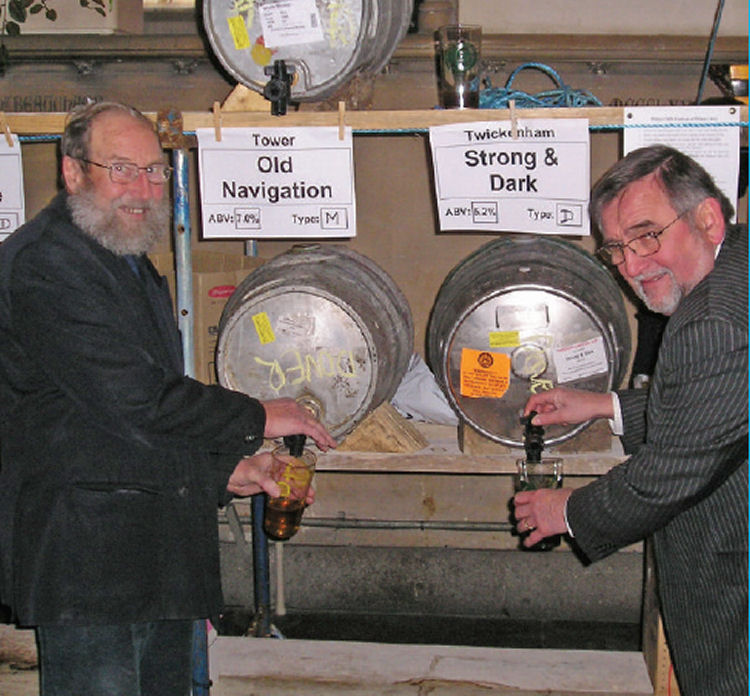
MP Gwyn Prosser joins festival organiser David Green pulling pints
at the beer festival at Dover Town Hall.
MP GWYN Prosser, who is a member of the Campaign for Real Ale and
belongs to the Parliamentary All Party Beer Group, dropped into the 2009
Dover Beer Festival on Saturday to pull a pint for CAMRA and sample some
of the wonderful real ales on offer.
"Dover's annual beer festival at
the town hall is going from success to success and drawing more and more
visitors," said Mr Prosser.
"On opening day on Friday people were queuing all the way past the town
council office and when I dropped by on Saturday morning the hall was
already almost full.
"I'm pleased to support the festival because as well as promoting good
local beers it attracts hundreds of extra visitors to Dover from across
the country and even from across the Channel which is good news for our
hospitality industry and good business for Dover."
|
|
From the Dover Express, 12 February, 2009
Real beer connoisseurs sup 625 gallons of 'nectar'.
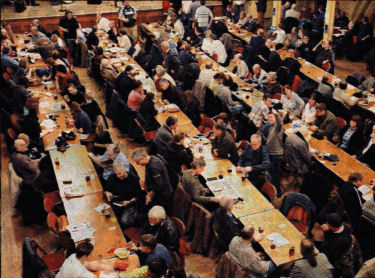 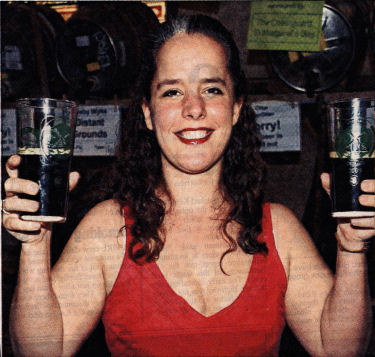
REAL ale lovers packed out Dover town hall at the weekend as hundreds
of drinkers supped almost 5,000 pints of top British beers.
The 16th annual White Cliffs Winter Ales Festival, which is organised
by the local branch of the 'Campaign for Real Ale, kicked off on Friday
lunchtime and the kegs had run dry by Saturday evening.
Volunteers from as far afield as he United States poured pints of
evocatively-named brews such as Old Stoatwobbler and Skullspliter to
drinkers from Britain and beyond.
The beer of the festival title, awarded to the first ale to be
polished off, was presented to Jaipur, an India Pale Ale which was gone
within little more than three hours on Friday afternoon.
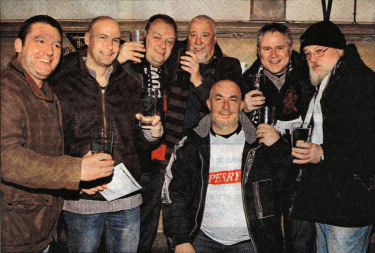 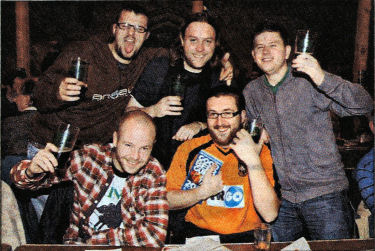
Festival organiser and local CAMRA member Dave Green, of Wyndham
Road, Dover, said the event had been a huge success.
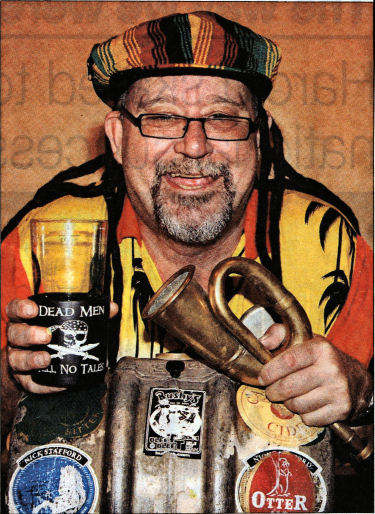
The 75-year-old said: "It was excellent and we just about sold out of
everything by 6pm on the Saturday. The atmosphere was brilliant and
there was no trouble and no problems.
"It
was a great success and we all very much look forward to next year."
CAMRA member and Dover MP Gwyn Prosser popped by at Saturday
lunchtime and tried his hand at pulling a pint.
He said: "I'm pleased to support the festival because as well as
promoting good local beers it attracts hundreds of extra visitors to
Dover, from across the country and even from across the Channel. This is
good news for our hospitality industry and good business for Dover."
|
|
From the Dover Express, 12 February, 2009
CAMRA BOASTS OF MASSIVE RISE IN ALE-LOVER NUMBERS
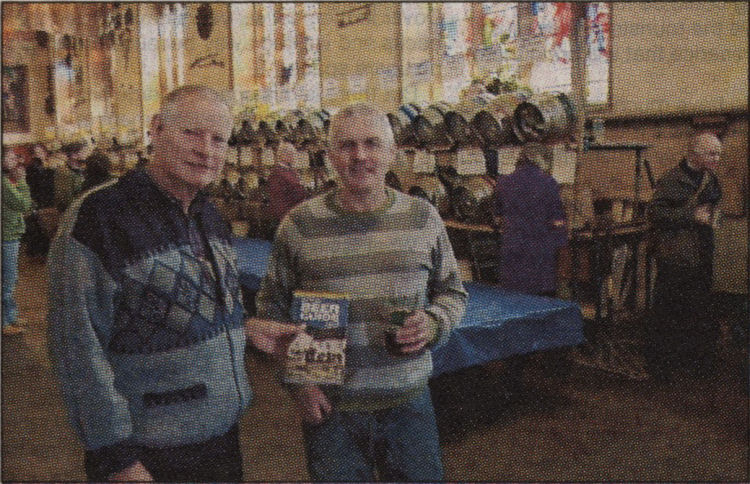
New Blood: John Pitcher, left, welcomes new member Roger Everett.
BEER lovers in the Dover district are flocking to join the Campaign
for Real Ale, the local branch has revealed.
Deal, Dover, Sandwich and District branch of Camra how has a
membership of 320, up from 300 at the start of the year.
This represents a real leap given there were only 200 people signed
up back in 2004.
Roger Everett, from Dover, became the 300th member as a Christmas
present from his daughter Kirsty.
At the White Cliffs Festival of Winter Ales in February he was
presented with a copy of the latest Good Beer Guide by branch membership
secretary John Pitcher.
Mr Pitcher said: "From our beginnings in the 1970s we reached 200
members in 2004 and it is great news that we have already expanded by 50
per cent since then.
"This shows a great commitment from people who join us in enjoying
real ale and supporting local pubs in these difficult times.
"A big thank you to Camra newcomers, not forgetting our longstanding
supporters who are also much appreciated."
For information on Camra and real ale go to the local branch website,
which is at
www.camra-dds.org.uk.
|
|
From the Dover Mercury, Thursday 4 February, 2010.
WINTER ALES AND ENTERTAINMENT.
THE White Cliffs Festival of Winter Ales takes place at Dover Town
Hall tomorrow (Friday) and Saturday, with more than 75 ales available.
Many of them have been produced by small independent or micro
breweries. All beers will be £2.50 a pint and food will also be
available. The festival is from 1pm to 11pm on Friday and 10.30am to 5pm
on Saturday.
It is organised by the Deal, Dover, Sandwich and District branch of
the Campaign for Real Ale.
There will be entertainment on Friday evening and Saturday afternoon.
Admission is £5 on Friday, £2 on Saturday with free entry for
card-carrying Camra members.
|
|
From the Dover Express, Thursday, 7
February, 2013. 65p. Report by Mike Sims
NOT A DROP OF 75 FESTIVAL ALES LEFT
Image of CAMRA stalwart Roger Marples on glasses for the 20th White
Cliffs Beer event.
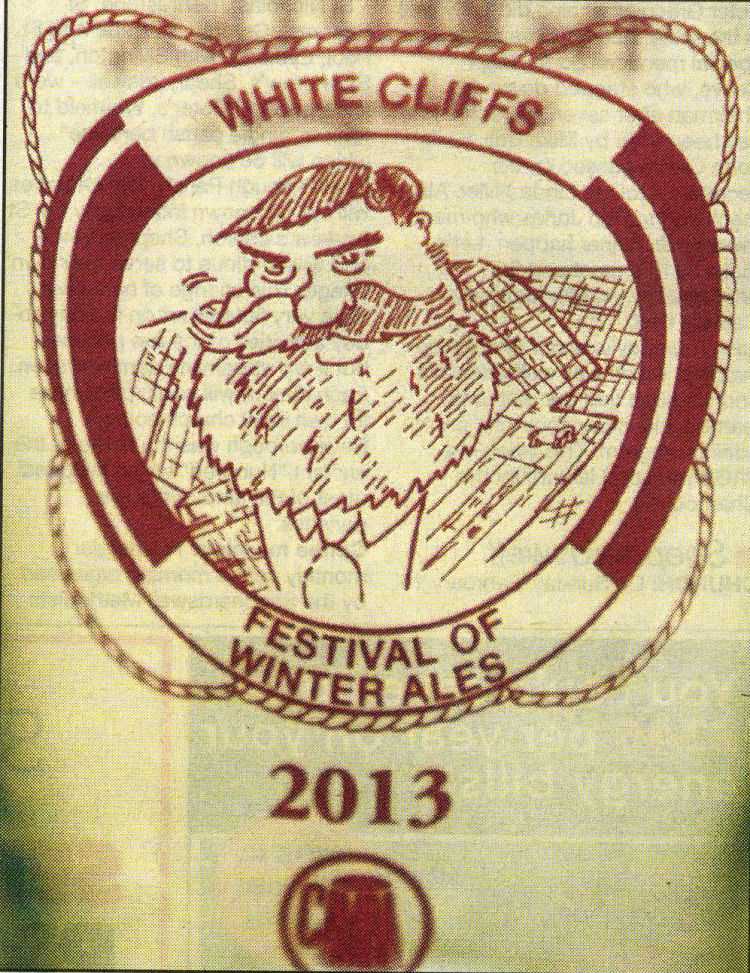
FROM Little Willy to Jingle Knockers, Dave Green took his role of ale
festival organiser seriously as he tried all 75 tipples before gates
opened on Friday. About 1,200 people visited this
year's White Cliffs Festival of Winter Ales, held at Dover Town Hall on
Friday and Saturday.
By 5pm on Saturday all barrels had run dry at the CAMRA festival, which
was celebrating its 20th anniversary.
Organiser Mr Green said he tried all 75 ales, including 16 from Kent, on
Friday morning “to make sure they were all ok”.
He said: “Someone had to do it. The festival went brilliantly, it was
packed. There was not a single drop left, but we can't order more
because we are restricted with the number of people.
“Ales are doing well at the moment, the popularity of micro pubs is
excellent news.”
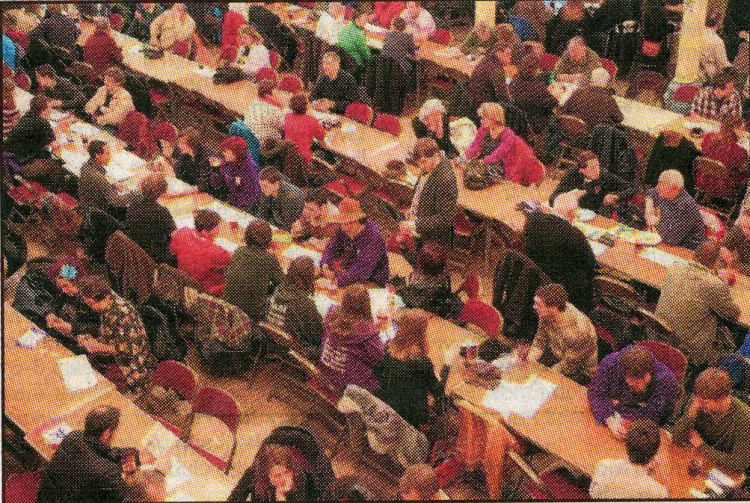
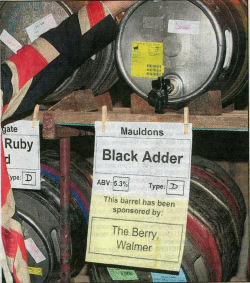 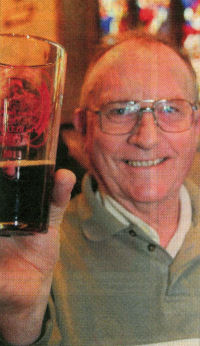 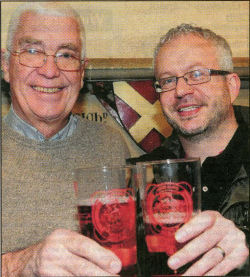
 |
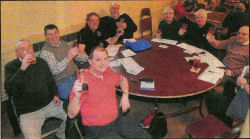 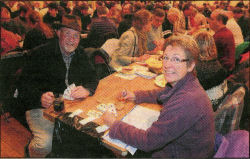 |
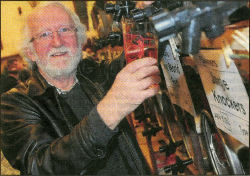 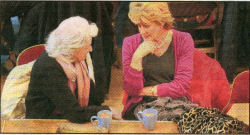 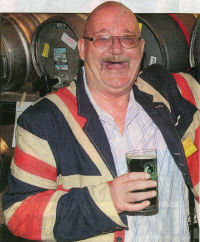 |
LICENSEE LIST
FOSTER Edward ????
|




















